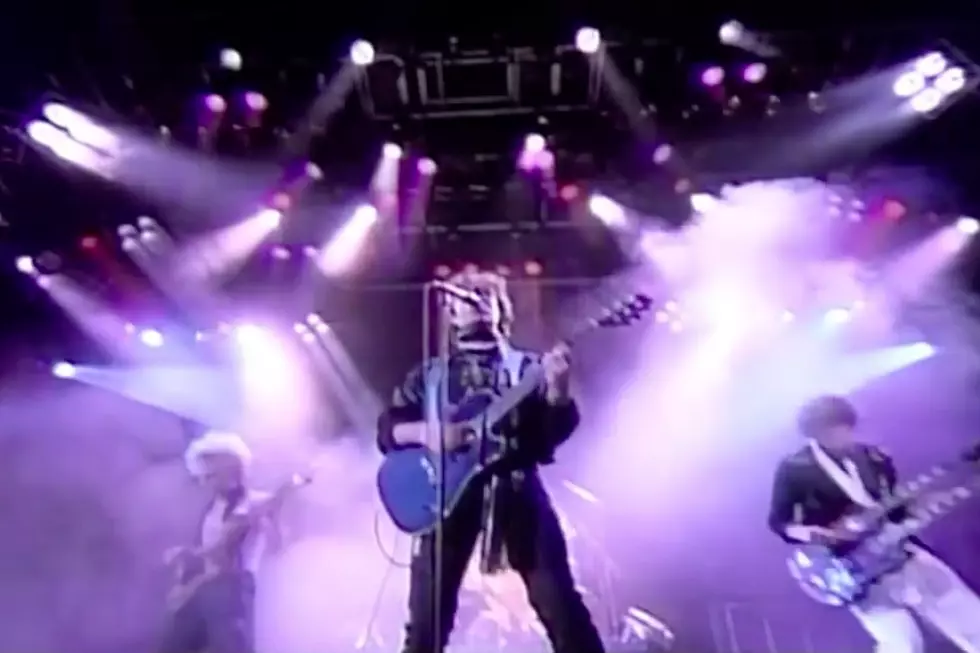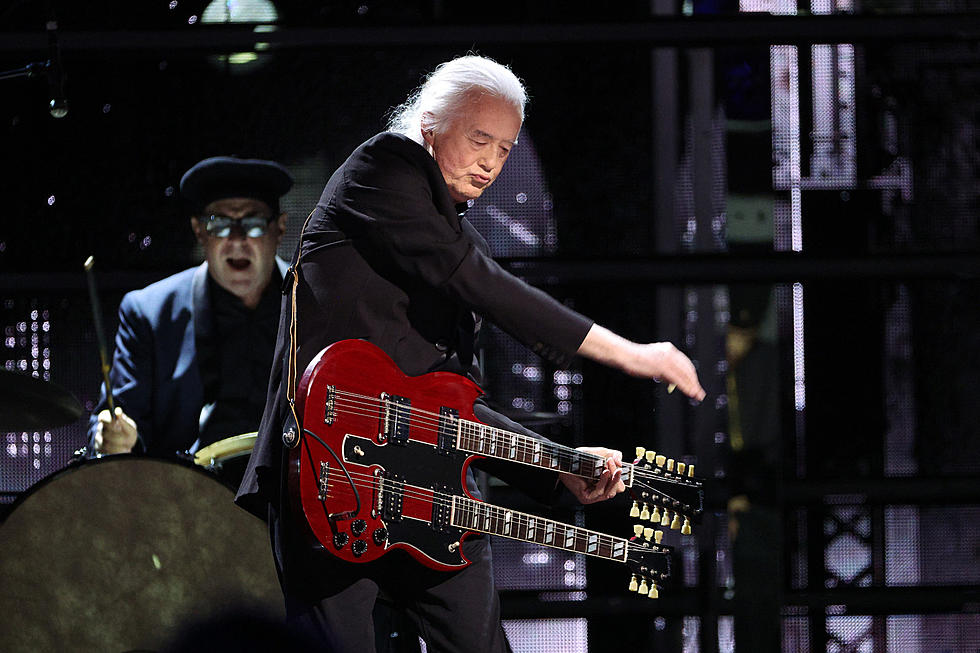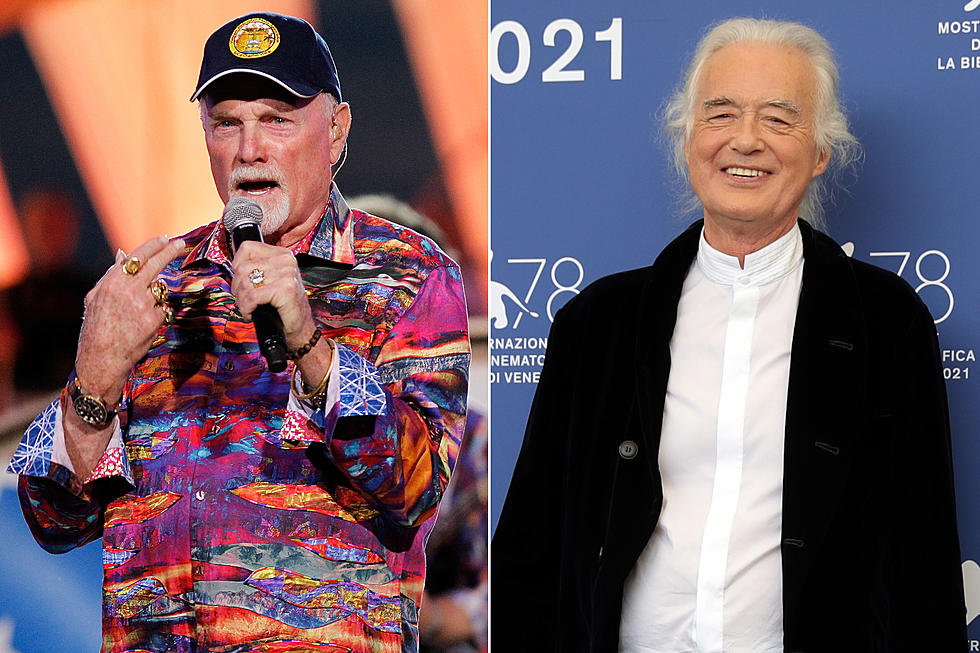
How Jimmy Page and Paul Rodgers Formed the Firm
"The main aim is to play some rock 'n' roll and have some fun."
That's how guitarist Jimmy Page described his mission statement with the Firm – the supergroup he formed with former Bad Company vocalist Paul Rodgers after both men found themselves out of a job following the dissolution of their respective bands in the early '80s. And although he admitted to wondering how he could possibly put together a second act after Led Zeppelin's breakup, Page said fate led him to his new partner relatively quickly.
"I tried to get together with Paul earlier, but it was difficult because he was doing a solo LP. But when the ARMS charity shows came up in America, Paul came with us. Stevie Winwood – who sang in London – had pulled out," recalled Page. "So we went to the States and had a very good tour, singing songs like 'Bird on the Wing,' which we did on the album. At the end of the of the tour I asked if he fancied carrying on and doing something else, because I really love his singing. He's such a brilliant singer. If I do a guitar solo I have to warm up and do three takes. He does it in one take. Note perfect. No problem! He's an amazing man."
Then, suddenly, "we got a call from Eric Clapton's management, because they were doing the ARMS Tour and they heard we were in the studio," Rodgers told UCR's Matt Wardlaw, in an exclusive interview. "Neither of us knew how they heard, because it wasn't an official thing. Could we put a band together and come out and play with Jeff Beck, Eric Clapton, Joe Cocker – a lot of great people – for the ARMS Tour? We said, 'Well, we don't really have a band.' They said, 'Okay, we'll get you a rhythm section.' We said, 'We've only got like half an hour of music.' They said, 'Well, that's all we need.' So we ran out of excuses."
Producer Stuart Epps, who engineered The Firm, shared his memories in another exclusive interview with UCR – saying the opportunity to bear witness to the album's creation was "one of the best moments of my musical life." Calling Rodgers "possibly the best, most amazing singer," he recalled that "they'd come in and I'd recorded it all live and I'd say to Paul, 'Are you going to go do the vocal?' and he'd say, 'I've just done it.' And I have to admit, it was great, but I just assumed that he'd overdub the vocals for sound-proofing and separation. There was none of that. He did it live and we said, 'That's the one.'"
In fact, according to Epps, although The Firm bore plenty of the processed audio hallmarks of the decade, the album was mostly recorded live in the studio. "Paul wanted to sing with the band. He wanted to record live. So I surrounded Paul with sound-proofing and baffles and that sort of thing, but it wasn't completely cut off," he pointed out. "Basically, a lot of the album was put down like that – very live, very atmospheric, great moments."
Though the band started with Page and Rodgers' connection, Epps remembers that neither of them came up with the name. In fact, it was the drummer they brought in for the project, Chris Slade. "He said, 'What about the Firm?' and everyone just went, 'Yes! That's it!,'" Epps told UCR. "It's a great name. I've never been in a room where that's happened before, really. Usually someone will say, 'No, that's terrible. Think again.' And it was pretty unanimous, and it was funny, really, because you had Paul Rogers who was in Bad Company and then you had the Firm, I suppose it leads from that quite well. That's how the name came about. It was the drummer's idea."
Listen to the Firm Perform 'Radioactive'
Artists of Page and Rodgers' vintage were in an odd position during the '80s – seen as dinosaurs by critics and fans who felt the rock titans of the '60s and '70s needed to step aside to make way for younger, fresher voices, or at least modify their sound to fall in step with the rising tide of New Wave-influenced acts who leaned harder on synthesizers than heavy guitars. Page, who professed to be a fan of dance-friendly acts like Frankie Goes to Hollywood, was aware of the steeper odds he faced as a "new" artist, but he made no apologies for the Firm.
"Yes, I am a musician of the '60s and '70s. I got fired by the music of Chuck Berry and Elvis Presley. I was hit by so much energy from their records. But every five years people get fired by the music they hear and want to become part of it," he told Creem. "So now, I'm past middle age. But what do you do when you get to middle age? There was no one for me to look up to who said, 'This is what you do next.' I read in the music press that after 30 you are fucked. But I'm not, and there's a lot more for me to do."
He admits that the post-Led Zeppelin era had been difficult, but the Firm seemed to give Page a new lease on life. "After the split, I just didn't know what to do. I lived in a total vacuum. I didn't know what I was doing. In the end, I went to Bali and just thought about things. And I wasn't sitting on the beach because it was the rainy season! I sat in my room thinking. Then I thought, dammit, I'm going to do the Firm and see if it works," added Page. "At my time of life I should just do what I enjoy."
According to Epps, the sessions for The Firm were just that – pure enjoyment. He called Rodgers "a pretty fiery guy to say the least," and admitted that he'd seen times during his short-lived project with former Who drummer Kenney Jones, the Law, "when he wouldn't be the easiest person to work with." But Epps recalled no turbulence whatsoever while the first Firm LP came together.
"I don't remember any cross words. It was all just great. It came together easily – maybe a bit too easily, I don't know," Epps shrugged. "Jimmy's incredibly easygoing in the studio. All of them were easygoing, really. A lot of it, when you hear stories about bands, a lot of it is myth, really. It's not always quite what it appears. But this was one of the best albums, one of the best times I've had."
The band personnel were far from the only ones thrilled with the end result. The Firm, recorded with Slade on drums and the multi-faceted Tony Franklin handling both bass and keys, wasn't exactly a sales juggernaut when it arrived in stores on Feb. 11, 1985, but it definitely performed respectably: The album peaked at No. 15 in the U.K. and No. 17 in the States, and spun off one crossover hit, "Radioactive," that broke the Top 40 while topping Billboard's Top Rock Tracks chart. Subsequent singles failed to exert as much of an impact on the pop charts, but "Closer" and "Satisfaction Guaranteed" were both rock hits.
Fittingly for a band that endured its first trial by fire on the road before it had even really cemented its lineup, the Firm also toured behind its self-titled effort – not a lot, given that the tour started in February and was over by May, but enough for audiences to get a feel for what this unexpected supergroup sounded like in person. "Jimmy was keen to go on the road, actually. I was less keen. I was a little burned on it," Rodgers admitted. "But we went out there, and it was a lot of fun."
Listen to the Firm Perform 'Midnight Moonlight'
Of particular interest to Zeppelin fans was the closing track on The Firm, a nine-minute piece titled "Midnight Moonlight." A reworked version of a "Physical Graffiti" castoff originally titled "Swan Song," it offered a nod to Page's illustrious past while allowing Page and Rodgers an opportunity to test their new songwriting bond.
"Jimmy brought me a track. Up until then, we'd just been sort of hanging out. I was working on a solo album, just layering tracks," Rodgers told UCR. "He brought me a piece of music on cassette – remember cassettes? – it was a 19-minute piece of music, and he asked me if I could write lyrics for it."
Affirming that "it was good for me to have another writing partner at that time," Rodgers continued, "I listened, and it was just an unbelievable piece of music. I felt it was a little bit long, so we narrowed it down, and I thought it was a curious song, because the chorus seemed to have an extra beat. I wrote some lyrics for it and brought them back to Jimmy and said, 'That chorus seems to have an extra beat,' and he said, 'That's because it does.' [Laughs.] 'It's 5/4 at that point.'"
Far less complicated was signature single "Radioactive," which Rodgers took sole songwriting credit for, and which he laughingly referred to as "a five-minute write."
"Jimmy liked the demo, so we decided to record it. A lot of people are surprised to find that I actually played the solo in that – it's a finger exercise," Rodgers revealed. "I wanted something that sounded kind of robotic, and Alexis Korner had showed me that exercise years and years ago."
Somewhat surprisingly, given the relatively warm response afforded The Firm, the band found a cooler reception awaiting when it returned with its second LP, Mean Business, on Feb. 3, 1986. Page later insisted the band was always supposed to be a short-term project, but it still came as a disappointment when he and Rodgers announced the end of the Firm quickly after Mean Business peaked at No. 22 on the Billboard chart.
Looking back, Rodgers seemed to concede that the decade's overall musical climate may have doomed the group from the start. "I didn't really like the '80s, to be honest with you," he shrugged in conversation with UCR. "There was some good music that came out, but it went a bit disco for me."
Their throwback approach, Epps said, was as unusual in that era as it is today. "That's the difference between then and now. There's not many bands that record that way when it really is live," he sighed. "If any, I mean, there are hardly any singers that can do that now – go and sing live with the band and record it, and that's going to be the master release. It's a bit unheard of."
As far as Slade is concerned, however, the Firm may one day ride again. "We were going to put it together again. There were talks between their people, our people, people and other people and it was going to be put back together," he revealed in 2014. "Then this tiny, lesser-known band called Led Zeppelin got back together and did their reunion, which knocked it on the head. Who knows what will happen? Never say never. It might happen."
Top 25 Rock Producers
Was Jimmy Page Almost Part of a New Supergroup?
More From Ultimate Classic Rock









